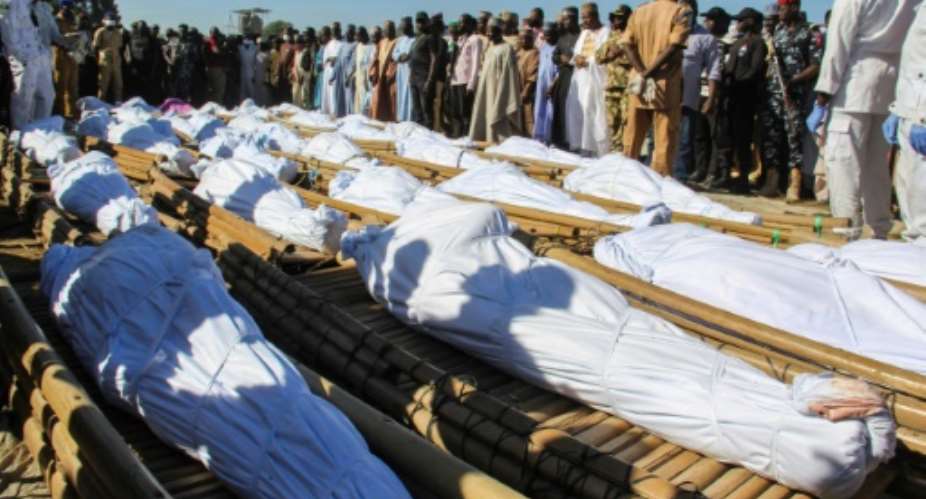Nigeria has been stunned by the slaughter of scores of people last weekend in the country's jihadist-ravaged northeast.
Assailants arrived on motorbikes, attacking villages outside the city of Maiduguri, the capital of Borno state, leaving at least 70 dead, according to the authorities.
The massacre set down a new benchmark of brutality -- in one case, the attackers tied up farm labourers working on rice fields before slitting their throats.
Here is what we know so far:
Who carried out the attacks?
Northeastern Nigeria has been in the grip of a jihadist insurgency that was launched by the Boko Haram group in 2009.
More than 36,000 people in Nigeria have died and around two million people have fled their homes.
In 2016, Boko Haram split into groups -- one that remained loyal to historic leader Abubakar Shekau, while the other lined up with the Islamic State West Africa Province (ISWAP). Neither has so far claimed responsibility for the latest massacre.
The attack took place "on the border of the two groups' areas of influence, so it's hard to say which of these groups is responsible," said Vincent Foucher of France's CNRS research institute.
Yan St-Pierre of the Modern Security Consulting Group said the killing of civilians was ostensibly "more akin to the operational methods of Boko Haram."
ISWAP has the reputation of preferring large-scale attacks on the military and of nurturing influence with the population in areas it controls, the two analysts agreed.
However, "ISWAP recently carried out violent attacks on civilians when their community refused to pay levies or set up self-defence groups to resist them," said Foucher, who believed a possible "hardening" of positions was underway within this faction.
What was the aim of the attack?
The massacres coincided with the first local elections to be held in the area since 2009. The ballot has been repeatedly postponed due to the security crisis.
It also coincided with efforts by the authorities and aid agencies to help displaced people return to their homes and fields to help avert a food shortage.
Even so, the motive for the attack is not fully clear.
Nigeria media, quoting local residents, said the jihadists sought to avenge their fighters who had been seized by the villagers and handed over to the authorities.
St-Pierre also noted that attacks on farms and their suppliers had increased since September.
The apparent goal is to destabilise supply lines and place jihadist organisations in control of agricultural sectors, he said.
What's the future for rural populations ?
The 11-year conflict in northeastern Nigeria is in stasis, St-Pierre said.
The insurgents still hold swathes of land, although the boundaries under their control have not changed significantly.
The authorities retain control over the towns and use air power and artillery to harass the jihadists, but without significant gains.
Pressure, meanwhile, is mounting to stave off an impending food shortage by returning displaced people to the land.
The UN says that on present trends, 5.1 million people will live in food insecurity by June 2021, a rise of a fifth in the space of a year.
Late last year, the Nigerian army decided to withdraw troops from advance positions after a spate of deadly attacks, and regrouped them in "super camps" that were claimed to be more effective and provide better protection.
But "the strategy means that there is a smaller military presence in rural areas," Foucher said. As a result, when a village comes under attack, it takes much longer for the army to intervene.
The plight of rural populations has been worsened by other factors, including poor harvests, coronavirus restrictions and the problems of humanitarian agencies operating in the area.
"They (the aid agencies) are increasingly targeted by terrorist organisations," St-Pierre said. Paradoxically, aid workers face suspicions within the army and among public opinion that they tacitly support the jihadists.





 We’ll no longer tolerate your empty, unwarranted attacks – TUC blasts Prof Adei
We’ll no longer tolerate your empty, unwarranted attacks – TUC blasts Prof Adei
 Bawumia donates GHc200,000 to support Madina fire victims
Bawumia donates GHc200,000 to support Madina fire victims
 IMF to disburse US$360million third tranche to Ghana without creditors MoU
IMF to disburse US$360million third tranche to Ghana without creditors MoU
 Truck owner share insights into train collision incident
Truck owner share insights into train collision incident
 Paramount chief of Bassare Traditional Area passes on
Paramount chief of Bassare Traditional Area passes on
 Two teachers in court over alleged illegal possession of BECE papers
Two teachers in court over alleged illegal possession of BECE papers
 Sunyani: Victim allegedly shot by traditional warriors appeals for justice
Sunyani: Victim allegedly shot by traditional warriors appeals for justice
 Mahama vows to scrap teacher licensure exams, review Free SHS policy
Mahama vows to scrap teacher licensure exams, review Free SHS policy
 Government will replace burnt Madina shops with a new three-story, 120-store fac...
Government will replace burnt Madina shops with a new three-story, 120-store fac...
